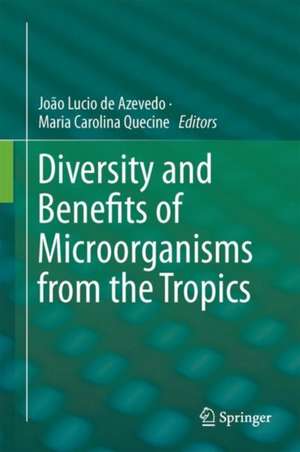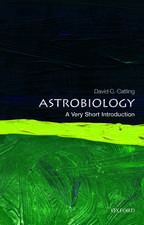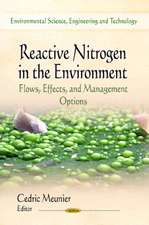Diversity and Benefits of Microorganisms from the Tropics
Editat de João Lucio de Azevedo, Maria Carolina Quecineen Limba Engleză Hardback – 22 iun 2017
| Toate formatele și edițiile | Preț | Express |
|---|---|---|
| Paperback (1) | 952.26 lei 43-57 zile | |
| Springer International Publishing – 11 aug 2018 | 952.26 lei 43-57 zile | |
| Hardback (1) | 958.38 lei 43-57 zile | |
| Springer International Publishing – 22 iun 2017 | 958.38 lei 43-57 zile |
Preț: 958.38 lei
Preț vechi: 1168.76 lei
-18% Nou
Puncte Express: 1438
Preț estimativ în valută:
183.39€ • 191.95$ • 152.64£
183.39€ • 191.95$ • 152.64£
Carte tipărită la comandă
Livrare economică 31 martie-14 aprilie
Preluare comenzi: 021 569.72.76
Specificații
ISBN-13: 9783319558035
ISBN-10: 331955803X
Pagini: 439
Ilustrații: XVIII, 439 p. 56 illus., 42 illus. in color.
Dimensiuni: 155 x 235 x 32 mm
Greutate: 0.82 kg
Ediția:1st ed. 2017
Editura: Springer International Publishing
Colecția Springer
Locul publicării:Cham, Switzerland
ISBN-10: 331955803X
Pagini: 439
Ilustrații: XVIII, 439 p. 56 illus., 42 illus. in color.
Dimensiuni: 155 x 235 x 32 mm
Greutate: 0.82 kg
Ediția:1st ed. 2017
Editura: Springer International Publishing
Colecția Springer
Locul publicării:Cham, Switzerland
Cuprins
Part I. Microorganisms in tropical environments.- Chapter 1. Diversity and Technological aspects of microorganisms from semi-arid environments.- Chapter 2. Why study endophytic fungal community associated with cact species?.- Chapter 3. Diversity and biotechnological potential of endophytic microorganisms associated with tropical mangrove forests.- Chapter 4. Endophytic microorganisms of the tropical savannah: a promising source of bioactive molecules.- Chapter 5. Overview on Biodiversity, Chemistry and Biotechnnological potential of microorganisms from the Brazilian Amazon.- Chapter 6. Diversity and prospection of South Atlantic Ocean Microorganisms.- Part II. Tropical Microorganisms and biotechnological applications.- Chapter 7. Tropical Cyanobacterial and Biotechnological applications.- Chapter 8. Induction of crypitc metabolites production through epigenetic tailoringin Colletotrichum gloeosporioides isolated from Sygidium commune.- Chapter 9. Secondary metabolites of endophytic microorganisms: techniques and biotechnological approaches.- Part III. Agricultural and livestock microorganisms in the tropics.- Chapter 10. Diversity and function of endophytic microbial community of plants with economical potential.- Chapter 11. Importance of mycorhizae in tropical soils.- Chapter 12. Diversity and importance of diazotrophic bactéria in agricultural sustainability in the tropics.- Chapter 13. Describing the unexplored microorganisms associated with guarana: a typical tropical plant.- Chapter 14. Beneficial microorganisms associated to sugarcane crop: the green gold for clean energy.- Part IV. Microorganisms: Promises and challenges.- Chapter 15. Translating endophyte research to applications: prospects and challenges.- Chapter 16. Ecological aspects on ruminal microbiome.- Chapter 17. Evolution of yeast selection for fuel ethanol: breaking paradigmas.- Chapter 18. Genetically modified organisms in Brazil: challenges and perspectives.
Notă biografică
DR JOAO LUCIO AZEVEDO – B.S. : University of Sao Paulo Brazil, in Agronomy 1960; PhD : University of Sheffield (Great-Britain)Genetics 1971; Associated Professor; University of Sao Paulo (1974); Pos-doctor: University of Nottingham UK 1979 and University of Manchester, UK 1988; Full professor at University of Sao Paulo (1984); Senior Professor (2009) till now. Specialization and areas of particular interest: Microbial genetics, microorganisms of agricultural interest ; endophytic bacteria and fungi: interactions between microorganisms and plants Biological control of insect-pests and plant diseases. Honors and Awards: Member of the Brazilian Academy of Sciences; Member of the Academy of Sciences State of Sao Paulo-Brazil; Prize Scopus contribution to increase scientific production in the country and formation of new PhDs (2006); Prize Bunge; Contribution to tropical agriculture (2009); Prize Frederico Veiga EMBRAPA - Contribution to Brazilian Agriculture (1993); Member of the Brazilian order of Scientific merit from 2000; Member emeritus of Brazilian Research Council- CNPq (2010); Professor Emeritus, Agriculture School, University of São Paulo. Brazil (2013); Luiz de Queiroz medal, Agriculture School, University of São Paulo (2014). Employment: Professor at Escola Superior de Agricultura Luiz de Queiroz ESALQ/USP, Brazil (1960-present). Coordinator: Microbiology sector. Centro de Biotecnologia da Amazônia (CBA) (2008-2011).
DR MARIA CAROLINA QUECINE –Post-doctoral: Department of Genetics, Escola Superior de Agricultura Luiz de Queiroz ESALQ/USP (2011-2013) and (2010 – 2011). Graduation: Direct Ph.D. in Genetics and Plant Breeding ESALQ-USP (2005 – 2010). Under-Graduation: Bachelor and Licentiate in Agronomic Engineering, ESALQ-USP (2000 – 2004). Research Interests and Activities: Experience in microbial genetics and molecular biology. Recent knowledge in microbial genomics with emphases in high throughput sequencing, genome assembly and gene annotation. Major interest in molecular genetics of plant-associated microorganisms, biological control of plant disease, molecular analysis of secondary metabolite and enzymatic compounds production to agronomic and industrial application. Employment: Assistant Professor: Department of Genetics. Escola Superior de Agricultura Luiz de Queiroz University of São Paulo, Brazil (2014). International experience: ASM YA - Young Ambassador of American Society of Microbiology to Brazil (2013). Ph.D. Sandwich - United States Department of Agriculture - USDA-ARS Horticultural Crops Research Laboratory. Corvallis, Oregon, United States. Supervision: Dra. Joyce E. Loper. (2008-2008). Awards: 3o Top Ethanol – Academic work (2012); Down Innovation and Sustainably (2010). José and Silvia Amador (2009); APS Annual Meeting (2009).11o Simpósio Internacional de Iniciação Científica da Universidade de São Paulo SIICUSP (2003).
DR MARIA CAROLINA QUECINE –Post-doctoral: Department of Genetics, Escola Superior de Agricultura Luiz de Queiroz ESALQ/USP (2011-2013) and (2010 – 2011). Graduation: Direct Ph.D. in Genetics and Plant Breeding ESALQ-USP (2005 – 2010). Under-Graduation: Bachelor and Licentiate in Agronomic Engineering, ESALQ-USP (2000 – 2004). Research Interests and Activities: Experience in microbial genetics and molecular biology. Recent knowledge in microbial genomics with emphases in high throughput sequencing, genome assembly and gene annotation. Major interest in molecular genetics of plant-associated microorganisms, biological control of plant disease, molecular analysis of secondary metabolite and enzymatic compounds production to agronomic and industrial application. Employment: Assistant Professor: Department of Genetics. Escola Superior de Agricultura Luiz de Queiroz University of São Paulo, Brazil (2014). International experience: ASM YA - Young Ambassador of American Society of Microbiology to Brazil (2013). Ph.D. Sandwich - United States Department of Agriculture - USDA-ARS Horticultural Crops Research Laboratory. Corvallis, Oregon, United States. Supervision: Dra. Joyce E. Loper. (2008-2008). Awards: 3o Top Ethanol – Academic work (2012); Down Innovation and Sustainably (2010). José and Silvia Amador (2009); APS Annual Meeting (2009).11o Simpósio Internacional de Iniciação Científica da Universidade de São Paulo SIICUSP (2003).
Textul de pe ultima copertă
This book addresses the diversity of tropical microorganisms and its applications in agriculture, renewable energy production and environmental protection. It covers several tropical habitats such as rain forests, mangroves, sea and river waters and describes how microorganisms isolated from these regions can be used to control insects and plant diseases, to improve sugar cane and biofuels production among other applications. The book also aims to bring researchers’ attention to the potential of tropical microorganisms for biotechnological purposes, an area that is still far from being well explored.
Caracteristici
Deals with the diversity and applications of microorganisms obtained from some few explored tropical world areas as forests, mangroves, sea and other water environments
The importance of tropical energy sources substituting petrol based on microbes is a point focused in some chapters as well the use of microbial genes to develop transgenic plants for several purposes
Presents a huge range of potential applications of microorganisms in tropical agriculture
Includes supplementary material: sn.pub/extras
The importance of tropical energy sources substituting petrol based on microbes is a point focused in some chapters as well the use of microbial genes to develop transgenic plants for several purposes
Presents a huge range of potential applications of microorganisms in tropical agriculture
Includes supplementary material: sn.pub/extras










